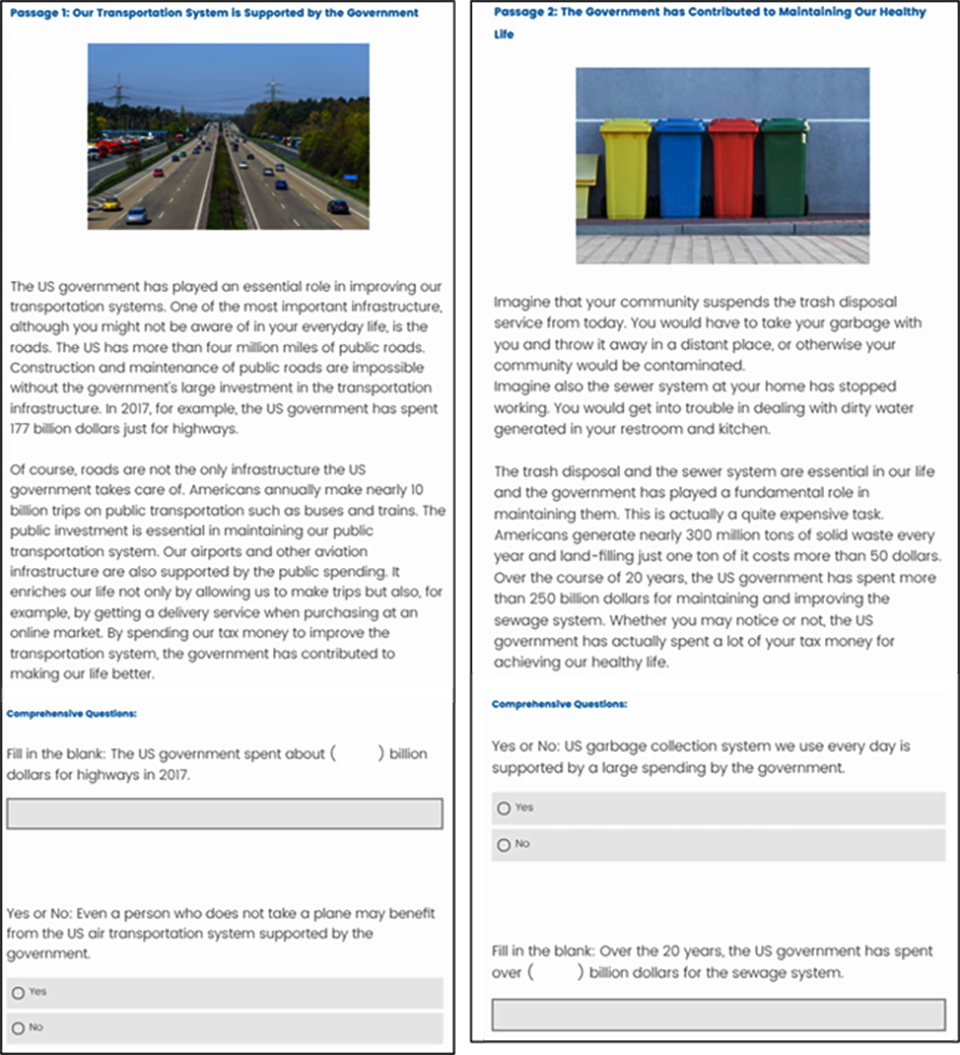2025.11.14 Friday
Study Shows People Support Higher Taxes After Understanding Benefits of Public Goods
Researchers explore how understanding the benefits of public goods can change public opinion about taxation and expenditure

Research overview
A research team led by Associate Professor Tomoko Matsumoto from the Institute of Arts and Sciences at Tokyo University of Science, Japan, along with Associate Professor Daiki Kishishita and Associate Professor Atsushi Yamagishi, both from Hitotsubashi University, Japan, has demonstrated that providing people with information about the universal benefits of public goods significantly increases support for higher taxation. This finding reveals a new mechanism that could contribute to reducing inequality by expanding government size while maintaining tax progressivity.
The research team conducted an experiment with approximately 3,000 United States (U.S.) citizens, providing information about the benefits that public goods such as transportation infrastructure and public sanitation bring to people. The results showed that support for expanding government size increased substantially among the group that received information, and this effect was observed uniformly regardless of income level or political stance. Meanwhile, there was almost no impact on people's views or support for the progressivity of taxes or expenditures.
These results suggest that investment in public goods functions as a "political foundation" that enhances citizens' support for government and enables redistribution by expanding government size. This is a groundbreaking achievement demonstrating that even in politically divided societies, raising awareness of public goods that benefit everyone can ultimately lead to reduced inequality.
This research was published online in the international academic journal The Japanese Economic Review on October 27, 2025.
Research background
How public goods are distributed to citizens and their effects have been studied both theoretically and empirically. Much of the previous research has focused primarily on the extent to which each income group benefits from public goods and how much tax each group pays to fund them.
However, in democratic societies, public opinion significantly influences policy, particularly fiscal activities. Conventional thinking holds that fiscal spending becomes possible when citizens understand the severity of inequality, and research has focused on citizen understanding. Conversely, multiple prior studies have suggested the possibility that governmental fiscal activities, such as welfare spending, can lead to citizen understanding.
Building on these research findings, the research team posed the question: "If citizens' understanding of the benefits of public goods advances, can we change their preferences toward taxation and public goods investment?" The team examined this previously overlooked possibility.
Dr. Matsumoto comments, "Inequality has been steadily growing for nearly half a century. Amid this global trend of widening inequality, to explore the possibility of reducing such inequality, we chose the highly polarized, high-inequality, developed nation of the U.S. as our experimental setting."
Prior to the experiment, the research team established the following hypotheses:
Hypothesis 1: Realizing the governmental role in providing public goods increases support for a larger government.
Hypothesis 2: Realizing the governmental role in providing public goods decreases support for tax progressivity.
Hypothesis 3: Realizing the governmental role in providing public goods decreases support for spending progressivity.
Hypothesis 4: The direction of the treatment effects in hypotheses 1-3 is independent of socioeconomic status and political ideology.
To test these hypotheses, the research team conducted an online survey in July 2021 with approximately 3,000 U.S. citizens. The U.S. was chosen as the research subject because it is politically divided and has a relatively small government among the Organization for Economic Co-operation and Development countries, making it optimal for testing hypotheses about government expansion.
Survey participants were randomly assigned to either a group that received information about the government's role in public goods (information group) or a group that did not (control group). The information group received three types of information about maintaining transportation infrastructure and public sanitation: specific costs and expenditure amounts, efficiency (lack of waste), and specific benefits they receive.
The results were as follows:
For hypothesis 1, support for bigger government (a 1% tax rate increase) rose dramatically by 10 percentage points in the information group. This result is noteworthy considering that tax increases are typically unpopular.
For hypothesis 2, regarding tax progressivity, the difference between those who received information and those who did not was only 1.9 percentage points, with no significant effect.
For hypothesis 3, when asked about the use of additional tax revenue obtained by the government, the information group showed a 3.8 percentage points decrease in responses saying, "should be used only for supporting the poor." This is a significant but not large difference. Support for maintaining existing welfare policies remained unchanged.
Particularly noteworthy are the results for hypothesis 4. The results for hypotheses 1-3 showed the same trends regardless of income level, political ideology, race, or gender. This suggests that even in divided societies, if there is prior information about public goods and the government's role, a unanimous consensus can be formed across political divides, potentially enabling expanded investment in public goods.
Future prospects
This research demonstrated that when citizens understand the benefits of public goods, support for expanding government size (raising taxes) increases. It also suggested that redistribution through government expansion (policies to reduce income inequality) is possible with almost no reduction in the progressivity of taxes or expenditures (where higher-income individuals pay higher tax rates and lower-income individuals receive more benefits).
These results indicate the possibility of a different approach to reducing inequality than traditional methods. Previously, the focus has been on methods to address inequality through increasing progressivity, such as heavier taxation of the wealthy or providing information showing the severity of income disparities. What this research newly demonstrates is that citizens' views can change through the provision of public goods and recognition of their benefits, enabling redistribution through government expansion, while maintaining progressivity.
Empirical research in the U.S. has suggested that the Nordic model--a welfare state providing universal public goods rather than goods targeted only to the poor--could be a viable model for other countries. Furthermore, since similar effects were observed regardless of income level, political stance, race, or gender, there is potential for broad consensus formation through appropriate information provision about public goods, even in politically divided societies.
However, this research is based on an online survey of U.S. citizens, and future research is needed regarding its applicability to other countries and cultural contexts. Additionally, further verification is required regarding impacts on actual policy implementation and voting behavior.
Dr. Matsumoto comments, "While inequality continues to widen without abating, I hope this provides hints for how we can maintain society while preserving a sense of mutual support."

Image title: Understanding the benefits of public goods can lead to changes in public opinion about government fiscal activities
Image caption: Researchers conducted a questionnaire-based study to evaluate taxation and found that if citizens understand the value of public goods and the government's role in maintaining them, public opinion about taxation and expenditure can change, potentially reducing inequality.
Image credit: Dr. Tomoko Matsumoto from Tokyo University of Science, Japan
Image link: https://link.springer.com/article/10.1007/s42973-025-00228-2
License type: CC BY 4.0
Usage restrictions: Credit must be given to the creator.
Reference
| Title of original paper | : | Public goods provision, preferences over public finance, and distributional effects |
| Journal | : | The Japanese Economic Review |
| DOI | : | 10.1007/s42973-025-00228-2 |
About The Tokyo University of Science
Tokyo University of Science (TUS) is a well-known and respected university, and the largest science-specialized private research university in Japan, with four campuses in central Tokyo and its suburbs and in Hokkaido. Established in 1881, the university has continually contributed to Japan's development in science through inculcating the love for science in researchers, technicians, and educators.
With a mission of "Creating science and technology for the harmonious development of nature, human beings, and society," TUS has undertaken a wide range of research from basic to applied science. TUS has embraced a multidisciplinary approach to research and undertaken intensive study in some of today's most vital fields. TUS is a meritocracy where the best in science is recognized and nurtured. It is the only private university in Japan that has produced a Nobel Prize winner and the only private university in Asia to produce Nobel Prize winners within the natural sciences field.
■
Tokyo University of Science(About TUS)

About Associate Professor Tomoko Matsumoto
from Tokyo University of Science
Dr. Tomoko Matsumoto is an Associate Professor at Tokyo University of Science. She received her Ph.D. in Politics from the University of Tokyo in 2016. Her research focuses on quantitative political science, including public opinion, elections, redistribution, and elite mobility. She has published more than 10 papers and delivered over 70 presentations. She previously served as a Designated Lecturer at Nagoya University and as a Visiting Research Professor at New York University. In 2024, she received the Tokyo University of Science Outstanding Researcher Encouragement Award.
Funding information
This study was financially supported by the Tokyo Center for Economic Research, the Murata Science Foundation, the Institute of Economic Research, Hitotsubashi University, and JSPS KAKENHI (Grant Numbers 20K22131, 22K13339, and 25K00629). Open Access funding provided by Tokyo University of Science.

